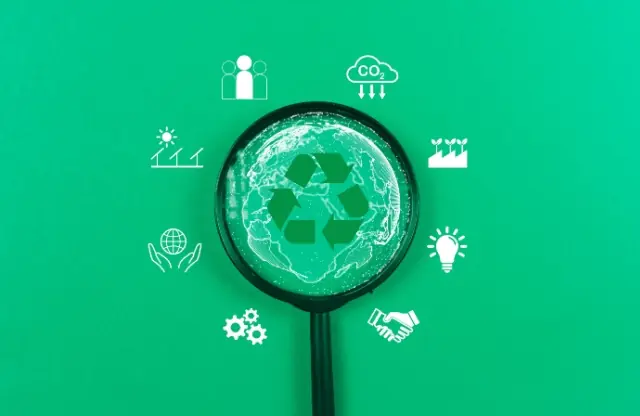How Extended Producer Responsibility in India Impacts Reporting
 Share
Share
 Copy Url
Copy Url

Extended Producer Responsibility (EPR) is a concept where producers are responsible for managing their products after consumers are done with them. More businesses are adopting EPR as they see the benefits of using sustainable practices. Today, EPR is important for creating a closed loop system where materials can be recycled and reused.
As companies focus on sustainability and the circular economy, EPR helps reduce waste and improves waste management. Extended producer responsibility in India is also growing, and this article will explain what EPR is, how it connects to sustainability reporting, and why it's becoming vital for businesses to succeed both corporately and commercially.
In this article, we’ll explore topics like “What is Extended Producer Responsibility (EPR)?”, how EPR is reflected in corporate reporting, and the commercial advantages of implementing EPR programs. You’ll also discover best practices for adopting EPR and what the future holds for extended producer responsibility in India. Whether you're a business owner, investor, or sustainability advocate, understanding EPR is key to staying ahead in today’s eco-conscious market. Let's jump right in!

What is Extended Producer Responsibility (EPR)?
Extended Producer Responsibility (EPR) is a policy approach where producers take on the responsibility for managing the end-of-life stage of their products. This means they must ensure proper disposal, recycling, or reusing of products once consumers no longer need them. The idea is to shift this burden away from consumers and governments, placing it directly on the producers. This encourages businesses to adopt more sustainable practices, such as designing products with easier recycling options or longer lifespans.
EPR is increasingly being seen as a way to close the loop in product lifecycles, contributing to the circular economy and reducing the environmental impact of products.
Importance in Waste Management
EPR plays a crucial role in reducing waste and pollution by pushing producers to think about the entire lifecycle of their products. It incentivizes the design of products that are easier to recycle or repurpose, thus minimizing waste at the source. This approach not only reduces the amount of waste sent to landfills but also lowers the environmental impact.
Producers who follow EPR laws are encouraged to minimize hazardous substances in their products, making it easier to manage waste in an environmentally friendly way. By promoting sustainable business practices, EPR helps align corporate actions with global environmental goals like those set out in the United Nations' Sustainable Development Goals.
Legal Framework and Compliance
The legal requirements for EPR vary across regions, but here are a few key points that guide compliance:
1. Mandatory Recycling Targets
Producers are required to meet specific recycling targets, ensuring a set percentage of their products are recycled or reused.
2. Producer Responsibility Organizations (PROs)
Businesses often join PROs, which handle the logistics of collecting, sorting, and recycling on behalf of the producers.
3. Penalties for Non-Compliance
Companies that fail to meet EPR obligations may face penalties, including fines or restrictions on product sales.
Countries like Japan and South Korea have highly developed EPR systems, while regions like the European Union enforce strict regulations, such as the Waste Electrical and Electronic Equipment (WEEE) Directive, to ensure businesses adhere to their environmental responsibilities.
This comprehensive approach helps businesses meet legal obligations while contributing to a more sustainable, environmentally responsible future.

How EPR Connects with Sustainability Reporting
Extended Producer Responsibility (EPR) not only helps manage waste but also plays a vital role in how businesses demonstrate their commitment to sustainability. This section explores how integrating EPR into a business model supports sustainability, how companies can include it in their sustainability reports, and the key metrics to track EPR efforts.
EPR as a Sustainability Measure
Incorporating Extended Producer Responsibility (EPR) into a company's business model shows a serious commitment to sustainability. EPR pushes businesses to take charge of their product’s entire lifecycle—from production to disposal. This means producers are responsible for recycling, reusing, or properly disposing of their products once consumers are finished with them. It encourages businesses to design products that are easier to recycle and minimizes waste at the source. By meeting EPR obligations, companies can prove they are not just greenwashing, but actively contributing to the circular economy and reducing their environmental footprint.
Integrating EPR into Sustainability Reports
Including Extended Producer Responsibility (EPR) in sustainability reports provides several benefits, demonstrating a company’s environmental responsibility to stakeholders. Here are 10 key benefits:
1. Transparency
Highlighting EPR efforts in reports boosts transparency, showcasing how businesses meet environmental goals.
2. Enhanced Brand Image
A clear EPR strategy can position a company as a leader in sustainable practices, improving brand perception.
3. Compliance Assurance
Reporting EPR activities shows that a company is adhering to EPR regulations and avoiding potential fines.
4. Stakeholder Trust
Investors and customers are more likely to trust a company that provides detailed information about its environmental impact.
5. Cost Savings
Effective waste management through EPR often results in reduced costs related to waste disposal and raw material use.
6. Reduced Environmental Impact
Demonstrating the reduction of waste and the increase in recycled material use enhances a company’s environmental credibility.
7. Support for ESG Goals
Including EPR actions in reports aligns with ESG (Environmental, Social, and Governance) standards, boosting investor interest.
8. Legal Compliance
Companies can avoid penalties by showing they meet required recycling and disposal targets under EPR obligations.
9. Market Differentiation
A strong EPR approach can help businesses stand out from competitors, especially in eco-conscious markets.
10. Sustainability Leadership
By reporting EPR achievements, companies can highlight their leadership in pushing for more sustainable business practices.
Key Metrics for Reporting EPR
To highlight EPR efforts, companies can report the following metrics:
1. Percentage of Recycled Materials
This measures how much of the raw materials used are recycled, showing the company’s commitment to resource efficiency.
2. Waste Reduction Rate
Track how much waste is diverted from landfills through recycling or reuse, a key aspect of EPR’s role in the waste management process.
3. Reduction in Carbon Footprint
Measure the environmental impact reduction from reusing materials and cutting down on waste production.
4. Recycling Targets Met
Report whether the company is meeting mandatory recycling targets set by regulations.
5. Cost Savings from EPR Implementation
Show how EPR efforts have reduced expenses related to waste disposal and raw materials.
6. Volume of Products Recycled or Reused
Report the total amount of product material that was recycled or repurposed after use.
7. Compliance with EPR Regulations
Demonstrate how the business meets legal requirements, including waste collection, recycling, and disposal.
8. Consumer Participation Rate
Measure how effectively customers are engaging in the recycling programs driven by the company.
9. Material Recovery Rate
Track the efficiency of recovering materials from used products for further use.
10. Total EPR Costs
Include costs associated with implementing EPR, showing transparency in how resources are managed.
Integrating Extended Producer Responsibility (EPR) into sustainability reporting is crucial for demonstrating corporate environmental responsibility. By tracking key metrics and showcasing the benefits of EPR, companies can not only meet EPR obligations but also gain a competitive edge and foster long-term stakeholder trust.

EPR and Corporate Reporting: Meeting Regulatory and Investor Expectations
Extended Producer Responsibility (EPR) is becoming essential for corporate reporting, especially in industries subject to strict environmental regulations. EPR compliance not only meets legal requirements but also attracts investors focused on ESG (Environmental, Social, and Governance) standards, making it an important factor in sustainability reporting.
Regulatory Requirements
Companies must show in their reports that they follow Extended Producer Responsibility (EPR) rules. This is especially important in industries with strict environmental laws. EPR makes producers responsible for their products throughout the entire life cycle. This includes recycling, waste management, and disposal. Businesses need to follow EPR regulations and prove it in their corporate reports. They must meet guidelines specific to their industry. Not complying can lead to penalties and hurt a company's reputation.
1. EPR Guidelines for Plastic Waste
Producers must assume responsibility for collecting and recycling plastic packaging. They have to report how much plastic they put on the market. They also need to meet specific recycling targets to match national goals for reducing waste.
2. EPR for E-Waste
For electronic waste, producers must take back old electronic products for recycling or disposal. Tech companies must report that they follow these rules to ensure harmful parts are handled safely.
3. EPR for Rubber Waste
Industries using rubber products must manage rubber waste responsibly. This is important for items like tires. Producers need to report proper disposal or recycling to show they comply with regulations.
4. EPR for Battery Waste
Producers of batteries must run collection and recycling programs. Batteries have hazardous materials, so it's essential to dispose of them environmentally. This helps meet regulatory obligations.
Investor Interest in EPR Practices
EPR practices help attract investors who care about ESG (Environmental, Social, Governance) performance. Investors prefer companies that take responsibility for managing waste from their products. By following EPR, businesses show they are committed to sustainable practices. This increases transparency and accountability in their reports. Aligning with ESG principles boosts investor confidence. It also opens up chances to get funds meant for sustainable projects. This way, companies ensure the effective use of resources and gain investor trust.
EPR and Financial Implications
EPR can bring financial benefits to companies. These include cost savings and less risk. Here are key financial advantages:
- Cost Savings from Recycling: Efficient recycling reduces waste disposal costs, saving money over time.
- Tax Incentives: Governments often offer tax breaks to companies that meet EPR targets. This encourages sustainable practices.
- Risk of Penalties: Following EPR rules lowers the chance of fines for not complying, protecting the company's finances.
- Enhanced Brand Value: Companies known for strong EPR practices attract eco-conscious customers and investors. This boosts brand loyalty and market value.
- Access to ESG Funds: Businesses excelling in EPR compliance can tap into funds for environmentally responsible companies.
Adding Extended Producer Responsibility (EPR) to corporate reporting isn't just following the law—it's a smart move. Companies that meet EPR obligations can draw more investor interest, improve transparency, and gain financial benefits. As rules keep changing, keeping up with EPR compliance is key for long-term success.

The Commercial Advantages of Implementing EPR Programs
Extended Producer Responsibility (EPR) programs offer more than just environmental benefits. They help companies improve their market position by boosting brand image, meeting consumer demand for sustainability, and gaining a competitive edge. Here’s a closer look at these advantages:
Strengthening Brand Image
Promoting EPR initiatives can greatly improve a company’s reputation as a leader in sustainability. EPR programs make businesses responsible for the entire life cycle of their products, from design to disposal. This cuts down waste and shows a commitment to a more sustainable future. By sharing their EPR efforts in reports and marketing, companies build trust with customers and stakeholders. This transparency helps create a positive image and aligns the brand with eco-friendly values, which are increasingly important today.
Meeting Consumer Demands for Eco-Friendly Products
Consumers today are more aware of their environmental impact. They prefer businesses that focus on waste management strategies and sustainability. Implementing EPR programs shows that a company is serious about reducing its environmental footprint, from product creation to the end of its useful life. This can lead to higher customer loyalty and more sales, as eco-conscious consumers choose brands that match their values. Companies that use recycled materials and reduce waste attract these customers, strengthening relationships with them.
Gaining a Competitive Edge
EPR programs give businesses a strong advantage in the market. They help companies meet regulatory requirements while appealing to consumers who care about sustainability. By meeting both consumer and environmental expectations, businesses can stay ahead of the competition. Additionally, many producers who adopt EPR programs often find ways to use fewer raw materials, reducing costs. By leading in sustainability and offering eco-friendly products, companies can stand out from competitors and expand their market share.
In short, EPR programs help businesses enhance their brand, satisfy growing consumer demands, and gain an edge in the market. As more businesses embrace these programs, they contribute to a healthier planet and set themselves up for long-term success.

Best Practices for Effective EPR Implementation
To effectively implement Extended Producer Responsibility (EPR), companies need to follow several important practices. These help businesses meet regulations and promote sustainability. Below are some of the best practices for successful EPR implementation, including working with supply chain partners, designing products for a circular economy, and regularly monitoring progress.
1. Collaborating with Supply Chain Partners
For a successful EPR program, businesses must collaborate across the supply chain. They need to work closely with suppliers, recyclers, and waste management partners to create an efficient strategy. This teamwork ensures that the entire product life cycle, from manufacturing to disposal, supports sustainability goals. Involving stakeholders early helps make recycling and processing smoother, improves compliance, and reduces the environmental impact.
2. Designing Products for the Circular Economy
Designing products that fit within the circular economy is key to fulfilling EPR commitments. This means creating items that are easy to reuse, recycle, or repurpose when their useful life ends. Products designed for durability and recyclability cut down on waste and contribute to a more sustainable future. This also reduces the need for new raw materials, helping to lower the environmental footprint.
3. Monitoring and Reporting EPR Performance
Regularly tracking EPR outcomes is crucial for ensuring that companies meet their goals. They should assess how much waste they recycle or divert from landfills. Transparent reporting of these results helps engage stakeholders and shows corporate responsibility. Continuous monitoring also highlights areas needing improvement, helping companies adjust their EPR strategies to better meet sustainability targets.
4. Leveraging Technology for Data Management
Using digital tools for tracking and managing product data greatly improves EPR outcomes. Technology helps monitor waste streams, track materials, and ensure recycling goals are met. Accurate data reporting makes it easier to follow EPR regulations and optimize sustainability efforts. Technology also helps companies respond quickly to any regulatory changes.
5. Engaging Consumers in EPR Programs
Creating consumer awareness about recycling and proper product disposal strengthens the success of EPR programs. Companies should make recycling programs simple and accessible, encouraging more customers to participate. This boosts recycling rates and lowers the environmental impact of products. A well-informed customer base supports a company’s waste reduction efforts and enhances its reputation as a sustainability leader.
By following these best practices, companies can successfully implement Extended Producer Responsibility (EPR), ensuring compliance and promoting long-term sustainability.

Future of Extended Producer Responsibility in India
India’s path to better waste management has been strongly influenced by the Extended Producer Responsibility (EPR) framework. EPR was first introduced in India to ensure producers manage their products throughout their entire lifecycle. As sustainability becomes a bigger focus, recent updates in legislation and technology are improving EPR registration and EPR certification processes. These changes are key to helping India achieve its waste management goals and support India's progress on the Sustainable Development Index (SDI). The advancements show India's commitment to meeting global environmental standards and improving waste management.
1. Proposed Changes and Legislative Updates
India's EPR regulations will become stricter as the government updates waste management laws. For example, the Plastic Waste Management (Amendment) Rules, 2022 aim to increase recycling and reuse of plastic, setting higher targets for producers. The Central Pollution Control Board (CPCB) monitors compliance and issues EPR certification. These updates focus on reducing plastic waste, moving India closer to its sustainable goals.
2. Impact of Technology and Innovation
Technology is changing how India handles EPR compliance. Digital platforms like the CPCB Monitoring Module make EPR registration and reporting easier. Smart tools, such as IoT-enabled devices, help manage the collection and recycling process more efficiently. These innovations create a more sustainable system by improving waste management.
3. Role of Technology in Enhancing EPR Efficiency
Technology plays a crucial role in improving EPR outcomes. Real-time tracking tools allow companies to monitor their recycling activities and comply with waste management rules. These tools help collect data, track recycling rates, and ensure companies meet EPR obligations.
4. Use of Digital Tools for Tracking and Compliance
Digital tools for EPR registration and compliance are increasingly used in India. Platforms like the National Dashboard and CPCB Grievance Redressal App make compliance easier by tracking progress. These tools ensure producers meet their recycling goals and reduce environmental impact.
5. Innovations in Recycling Technologies
New recycling technologies are boosting India's waste management abilities. Automated sorting systems and waste processing machines help producers recycle more efficiently. New methods in plastic and electronic waste recycling align with the circular economy and reduce reliance on raw materials, contributing to India's progress on the sustainable development index.
India’s EPR framework is evolving with changes in law, technology, and innovation, helping the country meet its sustainability targets and promote a cleaner, greener future.
Extended Producer Responsibility (EPR) Simplified: Let Report Yak Design Your Reports
Extended Producer Responsibility (EPR) has become an essential component of sustainable waste management in India. As EPR policies continue to evolve through stricter regulations and innovative technologies, businesses must stay proactive in their reporting and compliance. EPR not only helps reduce waste and environmental impact but also improves brand image and attracts eco-conscious investors. Companies that adopt EPR will see long-term benefits, from meeting regulatory requirements to enhancing their market position.
If your business needs expert assistance in creating sustainability and ESG reports, Report Yak is here to help. As India's top sustainability report and ESG report design agency, we’ve produced LACP award-winning reports. Check out our Showcase to see our work, or visit our Services page to learn more. For inquiries, feel free to email us at contact@reportyak.com, WhatsApp us, or call 1800 121 5955 (India). You can also submit your requirements via our Contact Form, and we’ll get back to you promptly. Let’s work together to make your sustainability reporting impactful!
Related Posts
-
How To Adopt BRSR Guidelines For Success
Oct 15, 2025Share
Copy Url
Simplifying ESG Disclosure for Better Impact
corporate reportingenvironmental and social initiatives
+6
Aug 28, 2025Share
Copy Url
GRI Sustainability Taxonomy: Learn How to Turn Data Into Advantage
corporate governancecorporate reporting
+11
Jul 1, 2025Share
Copy Url


